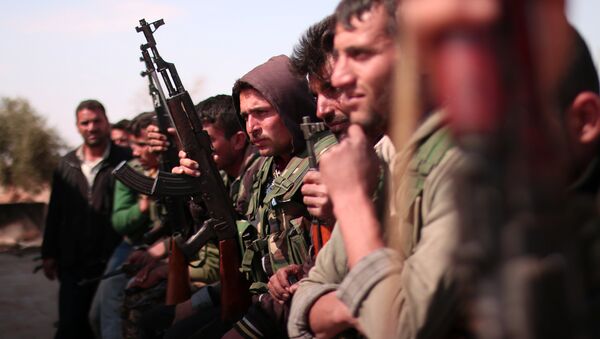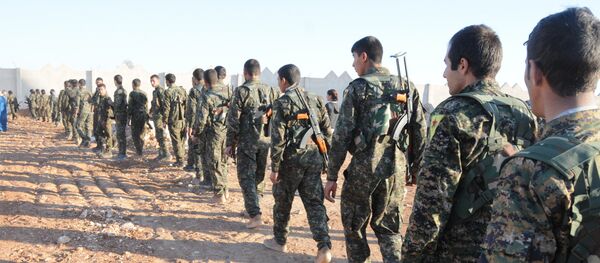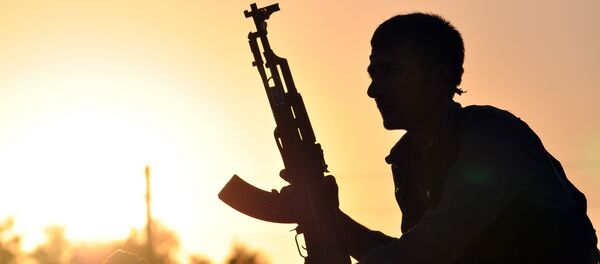Although the days of Daesh (ISIS/ISIL) are numbered, as experts suggest, a new terrorist group may soon take their place.
Speaking to RT, Director of the Center for Middle Eastern and Central Asian Studies Semyon Bagdasarov and Anton Mardasov, head of the Department of Middle Eastern Conflicts at the Institute for Innovative Development, shed light on the issue.
"Daesh's days are numbered," Anton Mardasov said. "They just do not have enough ammunition. This leaves an imprint on their actions."
"Tabqa is the city whether the largest Syrian hydroelectric power plant is located," Bagdasarov noted, "Self-defense units with the [Kurdish] Democratic Union Party [PYD] have taken Tabqa's airport and continue to storm the city."
Bagdasarov suggested that if the Syrian Kurds seize the city, the two largest hydroelectric power plants (Tabqa and Tishrin) will be under the PYD's control.
He also noted that Daesh continues to control a number of less significant areas including, for example, locations in the vicinity of Palmyra with oil and gas fields. The terrorist group also conducts operations in the Homs governorate and in the province of Aleppo, on the western bank of the Euphrates river.
According to Bagdasarov, having been expelled from Raqqa, Tabqa and Deir ez-Zor, Daesh will constitute a number of small isolated groups scattered around the Syrian Desert. They will be most likely involved in reconnaissance and sabotage operations only, he believes.
Currently the Syrian Arab Army (SAA) controls about 40-45 percent of the country's territory, Bagdasarov noted, adding that there are still a number of jihadi enclaves within this territory.
"One of these enclaves is East Ghouta, near Damascus," he said.
On the other hand, the Kurdish militias do not allow the SAA to launch an eastward offensive, Bagdasarov remarked.
"The Kurds has cut the route to Raqqa [for the SAA]. They [the SAA and the Kurdish militia] have not reached an agreement yet," Bagdasarov noted, assuming that if the Syrian Kurds were granted full autonomy the situation would be different.
He highlighted that the US military has taken advantage of this controversial situation: they are using the Syrian Kurds to solve their own tasks on the ground.
What is Washington's major goal?
Speaking to RIA Novosti Tuesday, political analyst Grigory Lukyanov explained that the US is pursuing a two-pronged strategy in Syria, trying to tackle Daesh and weaken President Bashar al-Assad and his allies by supporting the Kurds.
"The United States needs to create alternative centers of power represented by the Kurdish and Arab opposition which could help to counterbalance excessive ambitions of Damascus and deter Iran, Russia and Turkey," Lukyanov elaborated.
Given this they can "unlock" Deir ez-Zor, where the SAA is engaged in a fierce fight with jihadists, Mardasov believes. By gaining ground in Syria the Kurdish militias will get a trump card, which they may use in their future negotiations with Damascus, he added.
However, although the Syrian Kurds have already maintained control over northeastern Syria, Turkey is likely to throw a wrench in their works, Bagdasarov assumed. According to the expert, Turkish President Recep Erdogan will do whatever it takes to prevent the creation of an autonomous Kurdish entity in northern Syria.
Meanwhile, a new terrorist coalition is emerging in Idlib.
The experts assumed that Daesh's place could soon be taken by the al-Nusra Front and its allies.
Bagdasarov called attention to the fact that a 50,000-strong jihadi force has recently accumulated in Idlib.
"Daesh 2.0 is now being created [in Idlib] under the auspices of the al-Nusra Front; the group is called the Organization for the Liberation of the Levant. All those [jihadists] who fled eastern Aleppo will join it. They will be also joined by defeated Daesh fighters," Bagdasarov said.
According to the experts, it is likely that the new terrorist organization will continue the war against the SAA and the government of Bashar al-Assad.





